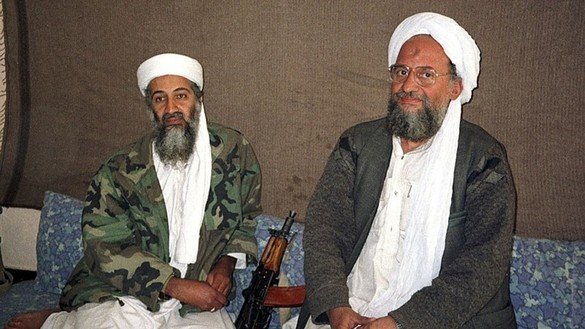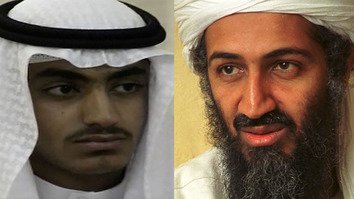KABUL -- The Taliban continue to be unclear about whether the group officially accepts that al-Qaeda was behind the September 11, 2001, attacks in the United States.
This continued vagueness is troubling observers who are watching the developments in intra-Afghan peace efforts and talks between the Taliban and the United States.
One of the key points to any potential agreement is that the Taliban disavow al-Qaeda and promise never to allow terrorist groups to use Afghan soil as a staging ground.
Statements over the years, and one just a month ago, suggest the Taliban maintain close ties to the terrorist group responsible for killing almost 3,000 Americans in one day.

Osama bin Laden sits with his advisor and now al-Qaeda leader Ayman al-Zawahiri during an interview with Pakistani journalist Hamid Mir in 2001 in Afghanistan.
![A man walks through the rubble after the collapse of the first World Trade Centre tower September 11, 2001, in New York. [Doug Kanter/AFP]](/cnmi_st/images/2019/11/15/20920-000_apw2001091109687-585_329.jpg)
A man walks through the rubble after the collapse of the first World Trade Centre tower September 11, 2001, in New York. [Doug Kanter/AFP]
![US marines march toward a security position after seizing a Taliban forward-operating base November 25, 2001. The United States invaded Afghanistan in 2001 in response to the Taliban's hosting of al-Qaeda, which perpetrated the September 11 attacks that killed nearly 3,000 Americans in one day. [US Department of Defence]](/cnmi_st/images/2019/11/15/20911-marines-585_329.jpg)
US marines march toward a security position after seizing a Taliban forward-operating base November 25, 2001. The United States invaded Afghanistan in 2001 in response to the Taliban's hosting of al-Qaeda, which perpetrated the September 11 attacks that killed nearly 3,000 Americans in one day. [US Department of Defence]
"Eighteen years ago, the United States invaded and occupied the pure land of Afghanistan with trivial excuses, with no justification or convincing evidence," said a statement posted to the official Arabic language Taliban account on Telegram and also posted to the group's official news website.
The October 7 message corresponds with the 18th anniversary of the US attack on Afghanistan that toppled the Taliban regime for protecting al-Qaeda and Osama bin Laden.
"At the time, the US was taking the 9/11 events as an excuse, while Afghanistan had nothing to do with it and there was no possibility for planning or executing such plots from Afghan soil," it continued.
The position is nothing new. Days after the attack took place in 2001, the Taliban denied it was planned from Afghanistan, asserting they had complete control over the whole country.
Suhail Shaheen, a spokesperson for the Taliban's political office in Qatar, also refused to depart from that line in an interview with the United States' CBS TV aired on August 22.
"That was not known. Still, it's not known who was behind it," Shaheen said when asked about 9/11.
Al-Qaeda admits attacks
What is even more peculiar about the group's stance is that al-Qaeda itself on multiple occasions admitted to perpetrating the attacks.
On October 29, 2004, the Qatar-based Arabic news agency Al-Jazeera aired a video that it received from al-Qaeda members in Pakistan. In that 17-minute video, Osama bin Laden admitted his group carried out the attacks.
"O American people, I am speaking to tell you about the ideal way to avoid another Manhattan, about war and its causes and results," bin Laden said, adding that al-Qaeda sought "to destroy towers in America so it could taste some of what we are tasting".
Also in 2011, a US raid in Abbottabad, Pakistan, led to the discovery of dozens of documents showing that al-Qaeda was preparing for the 10th anniversary of the September 11 attacks.
Countless videos, statements, and eyewitness accounts -- many from al-Qaeda and the Taliban -- all prove that al-Qaeda's base was in Afghanistan when the September 11 attacks occurred.
Struggling for relevance in the public eye, al-Qaeda on the 17th anniversary of the September 11 terrorist attacks issued a public statement reiterating its responsibility for the atrocities and slamming all those who believe otherwise.
Despite the overwhelming evidence of al-Qaeda's guilt and its many confessions, the Taliban continue to deny certain facts.
Taliban and al-Qaeda: a long-term relationship
The Taliban's position shows their deep and long-term ties with al-Qaeda, say analysts.
"The Taliban have 25-year-old relations with al-Qaeda, and the recent position of the group [the Taliban] on the 9/11 attacks is part of the Taliban's tactical approach to confuse public sentiment around the world," said Muhammad Ali Ahmadi, a political affairs analyst in Kabul.
"The Taliban sympathise with al-Qaeda, and they share views and ideologies with them," said Ahmadi. "They still haven't denied their relations with al-Qaeda, and they have even appeared as spokespeople for al-Qaeda in some incidents, especially when an al-Qaeda leader in Helmand was killed."
A few hours after the killing of Asim Umar in a special joint operation, leader of al-Qaeda for the Indian Subcontinent (AQIS), the Taliban rejected the news of his death on September 23.
"I remember perfectly well that after the 9/11 incident, the United States asked the Taliban to hand Osama bin Laden over, but contrary to the views of the Afghan people, the Taliban leaders provided support and protection to the al-Qaeda leader," said Sayed Safiullah Hashemi, a member of the Meshrano Jirga (upper house of parliament) from Samangan Province.
"It's totally clear that the Taliban had given refuge to the leader and members of al-Qaeda, and both groups had strategic relations and joint operations in Afghanistan," said Hashemi. "But by stating that al-Qaeda wasn't behind the attacks on America and that it isn't known who perpetrated those attacks, the Taliban are denying their long-term partner's responsibility in killing thousands of civilians."
Once the Taliban began taking part in the peace talks, they sought to convey a message to the international community that they knew nothing about 9/11 and that it was not planned in Afghanistan, say analysts.
"One of the important terms in the Qatar negotiations was that the Taliban would cut their ties with al-Qaeda, which the Taliban agreed to, but the negotiations failed," said Moqadam Amin, a political affairs analyst in Kabul. "Since it is expected that the talks will resume, the Taliban will try to tell the US and the world through the international media that they were not aware of the 9/11 incidents."
'Until their last breath'
"I believe that the Taliban haven't severed their ties with al-Qaeda because they want to retain their fighting power and avoid becoming weaker," said Amin. "They still receive financial and military resources from the network."
"At that time, the Taliban and al-Qaeda shared the view of jihad against the infidels," said Abdul Shakoor Salangi, a political affairs analyst in Kabul. The 9/11 attacks "were met with international condemnation, especially from Islamic countries, but now the Taliban's position on the incident tries to make al-Qaeda and themselves immune from responsibility."
"Suhail Shaheen's recent statements reveal the ties between the Taliban and al-Qaeda, and I think al-Qaeda still provides financial and military support to the Taliban and shares intelligence with them," said Basir Ahmad Yousufi, an international affairs analyst in Kabul.
"The Taliban will try to keep alive their relations with al-Qaeda until their last breath," he said.
"There is a blurred line between al-Qaeda and the Taliban now," Afghan National Security Adviser Hamdullah Mohib told Fox News on October 1. "They have been inter-marrying, they work together, their ideologies have merged. There is very little difference between the Taliban and al-Qaeda today."
[Sulaiman contributed to this report from Kabul]

![Taliban leaders continue to deny al-Qaeda's role in the September 11, 2001 attacks against the United States, even though the terrorist group admits it carried out the attack from Taliban-controlled territory. [File]](/cnmi_st/images/2019/11/15/20848-talibanaq-585_329.jpg)







There is an irony in Afghanistan where they say that once up on a time on a roof, in one cot a woman's son and daughter-in-law and in the other cot her daughter and son-in-law were sleeping together. The woman called [from her cot] on her daughter-in-law, hey girl, take some distance from your husband as the weather is hot [not to disturb him]. After a while, she asked her daughter to get closer to her husband so he does not to feel cold. At this time, her son or daughter-in-law told her [to the woman], It is surprising as There are two types of weather on a single roof Americans think that only they are intelligent and the rest of the people are eating hay and are animals. I remembered this as if the issue was from their business partner and "America's holy warrior" against the soviets and they attacked on Afghanistan because of his existence as a result of which they killed both their own soldiers and countless of Afghans, then what kind of punishment they gave to Pakistan as that beast was recovered in Pakistan and even beside the military academy of the country, they gave any punishment to Pakistan? They gave even more money to Pakistan which made their [Pakistani] army's pockets and banks full. The fact is that all these are just lies and drama.
Reply2 Comment
The Taliban are liars like Satan the Father of Lies
Reply2 Comment